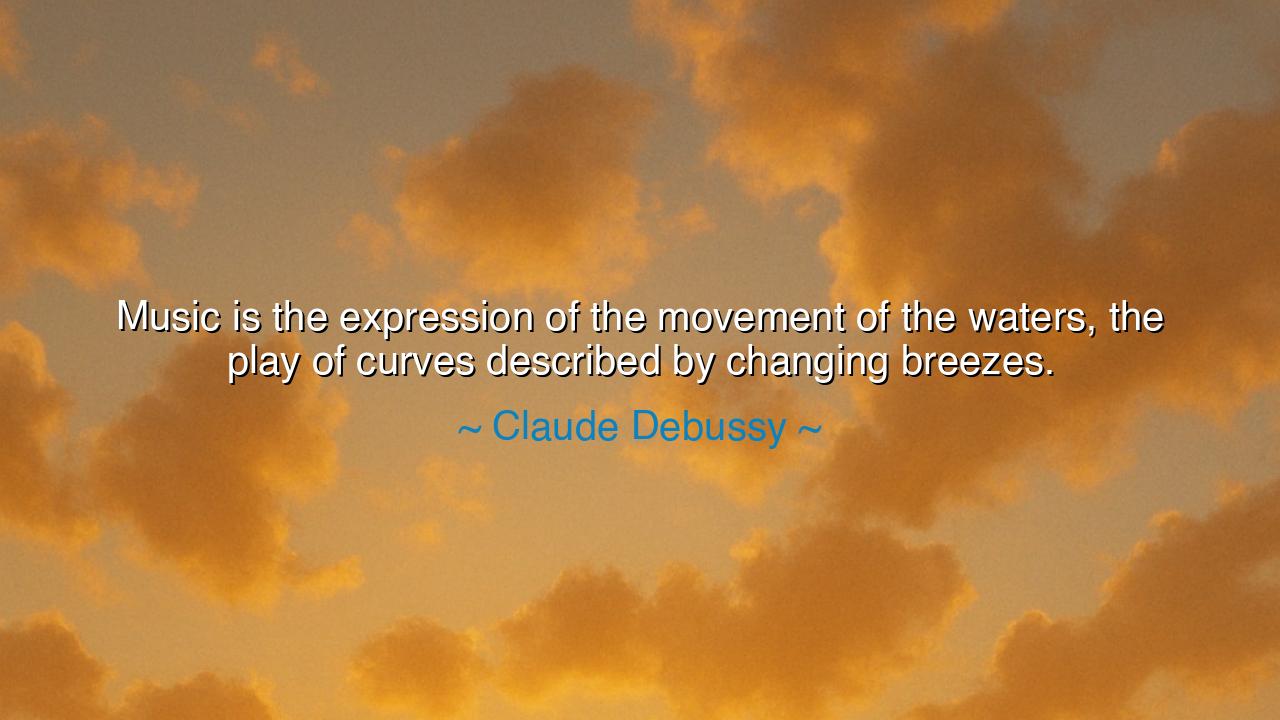
Music is the expression of the movement of the waters, the play
Music is the expression of the movement of the waters, the play of curves described by changing breezes.






The visionary composer Claude Debussy, master of shimmering harmonies and painter of sound, once uttered these words of eternal poetry: “Music is the expression of the movement of the waters, the play of curves described by changing breezes.” In this saying, Debussy reveals what he himself accomplished in his art: he transformed music from rigid structure into living nature. For him, music was not a machine of rules and formulas, but a flowing, breathing element, as natural as a river’s current and as free as the wind that stirs the leaves.
To call music the movement of the waters is to recognize its fluid essence. Just as streams and oceans never remain still, music too is in constant motion—rising, falling, surging, and receding. Waters can be gentle as a brook or violent as a storm, and so can sound. Debussy’s vision was to let his compositions mimic these eternal rhythms, crafting pieces that ripple like moonlight upon the sea or crash like waves upon the rocks. He saw music not as a wall to be built, but as water to be released, taking its form according to the vessel of the moment.
The second part of his wisdom speaks of the play of curves described by changing breezes. Wind is unseen, yet its presence is known through the swaying of branches, the bending of grasses, the shifting of clouds. So it is with music: the invisible spirit of emotion is made visible through melody, harmony, and rhythm. Where the academic might chart lines of theory, Debussy sought the curve, the sway, the gentle bend of sound shaped by feeling. His was not the music of the straight road, but of the winding path through forest and shore.
Debussy himself lived this truth. In an age dominated by the grandeur of Wagner and the strict traditions of classical form, he broke away, listening instead to the sounds of nature and to his own spirit. When he composed Clair de Lune, he did not merely arrange notes; he gave us moonlight in sound, a pool of quiet reflection stirred by delicate ripples. When he wrote La Mer (The Sea), he did not describe the ocean with words, but allowed the orchestra to become the ocean itself—its depths, its tempests, its shimmering surface under the sun. These works were born directly from his belief that music is the echo of natural forces.
History offers similar visions. The ancient Greeks spoke of the music of the spheres, believing that the movement of celestial bodies created a harmony too vast for mortal ears. The Chinese sages of old crafted their flutes and zithers to mirror the sound of wind in bamboo or water in mountain streams. And in the spiritual songs of countless peoples, music has always been understood not as invention but as discovery—the capturing of nature’s eternal melodies. Debussy’s words stand firmly in this ancient tradition, but clothed in the language of his own genius.
The lesson for us is this: music is not only an art to be studied, but a life to be felt. We must learn to hear the world around us as music—the sound of rain, the hum of wind, the rhythm of footsteps, even the silence between breaths. In doing so, we awaken not only to beauty, but to connection. Music reminds us that we are part of the same great rhythm as the waters and the winds, that our lives, too, are movements in the eternal symphony of existence.
Practically, this means: listen deeply to the world. Do not hear only with the ear, but with the soul. When you create—whether music, words, or deeds—let it flow like water, let it bend like wind, let it breathe. Do not force it into rigid forms, but let it be alive, natural, free. And when you face struggles, remember the waters and the breezes: that even in turbulence, there is beauty; even in change, there is grace.
So let Debussy’s wisdom be your guide: music is the language of nature itself, the song of waters and winds, the eternal play of motion and curve. To hear it is to awaken. To create it is to join the chorus of the world. And to live by it is to become part of the endless river of harmony that flows through all things.






AAdministratorAdministrator
Welcome, honored guests. Please leave a comment, we will respond soon